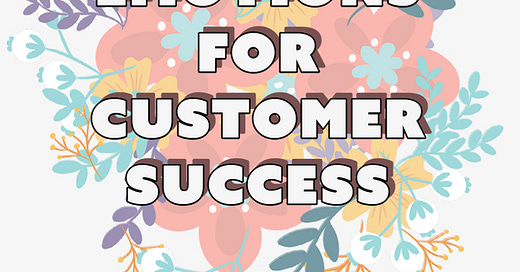Harnessing the Power of Emotion: 4 Key Drivers for Customer Success in 2024
[Last updated: Aug 17, 2024]
In Customer Success, we often focus on metrics and strategies.
However, the heart of successful customer relationships lies in understanding and leveraging human emotions.
Recent research from the Harvard Business Review confirms that up to 95% of purchasing decisions are subconscious and driven by emotions, with rational logic following as justification. (Source: feedbackly)
The Psychology Behind Customer Success
Customer Success often resembles a therapy session, where we listen intently to understand pain points and challenges.
Positioning ourselves as guides with actionable solutions can help create compelling narratives that resonate with our customers.
Dr. Daniel Goleman, a renowned psychologist and author, states:
"In a complex service economy, customer success is about reading emotions and reacting appropriately."
Kirsten DiChiappari, VP of Customer Success at vCom Solutions, adds:
"If you can create opportunities for a customer to grow revenue, you've got their attention. If you can solve a problem for them, saving them time or money, and if you can do it faster or better than they could themselves, you've got their attention."
Read my full interview with Kirsten DiChiappari for more insights.
4 Key Emotions to Enhance Customer Relationships
1. Happiness: The Power of a Smile
Creating Happy Customers: The goal isn't to make customers happy, but to ensure they're happy from day one. A simple yet effective way to achieve this is through smiling.
Benefits of Smiling:
Conveys positivity through your tone of voice
Proven to be contagious
Influences others' moods positively
Creates empathy with customers
A 2023 study by the Journal of Consumer Research found that customer service representatives who smiled during phone calls increased customer satisfaction by 23%.
Pro Tip: Always wear a smile during customer interactions, whether on phone calls, remote meetings, or in-person reviews.
Kevin Herrholtz, VP of Customer Success at AddShoppers, emphasizes:
"It's always people first, tech second. The challenge that we still have today is properly scaling customer success so that all clients receive a human-first experience that is supplemented with technology."
Read my full interview with Kevin Herrholtz for more insights.
For more insights on creating satisfied customers, check out my guide on how to become a great Customer Success Manager.
2. Selfishness: Leveraging "Good Selfishness"
Understanding that customers prioritize their own needs allows us to better serve them.
A 2024 survey by Forrester Research revealed that 72% of customers expect companies to understand their unique needs and expectations.
Focusing on "good selfishness" will help you:
Fulfill customer desires
Go the extra mile
Create stronger partnerships
Deliver more than expected
Melissa Garcia, Director of Renewal Operations at Chief, shares:
"Customers are primarily interested in their own KPIs, not ours. Understanding this starts with attentive listening, asking pertinent questions, and then articulating how our offering aligns with their goals. It's about demonstrating tangible proof of value over and over."
Read my full interview with Melissa Garcia for more insights.
Learn more about leveraging customer needs in my article on balancing sales and customer success in SaaS.
3. Fear of Losing: Motivating Action
People naturally seek comfort and security. Use this tendency to your advantage:
Highlight potential negative outcomes of inaction
Demonstrate the positive impact of taking the necessary steps
Utilize the "loss aversion" phenomenon
Help customers visualize the business impact of not taking action
A 2024 study in the Journal of Marketing found that framing product benefits in terms of avoiding losses was 2.5 times more effective in driving conversions than emphasizing gains.
For more on leveraging psychological principles in customer success, read my article on 7 powerful psychology secrets to boost customer success.
4. Belonging: Building a Supportive Community
Creating a sense of belonging is key to customer engagement and supporting business goals.
Implement this by:
Establishing user groups and communities
Providing environments for customers to engage with peers
Collecting feedback to improve products or services
Fostering a supportive atmosphere for idea-sharing
Krystel Leal, Head of Customer Success at OneText, notes:
"The customer success community is incredible! If you're a customer success manager or just really passionate about customer experience, don't be shy to share your thoughts, ask questions, and share insights on social media or at events. You never know, you might just be influencing someone with what you have to say."
Read my full interview with Krystel Leal for more insights.
Discover more community-building strategies in my guide on customer success team building.
Emotional Intelligence in Customer Success
Emotional intelligence (EQ) is a key skill for Customer Success Managers (CSMs) to navigate the complexities of customer relationships.
A 2024 study by Deloitte found that CSMs with high EQ scores outperformed their peers by 58% in customer retention metrics. (Source: wisernotify)
Key aspects of EQ in Customer Success:
Self-awareness: Understand your own emotions and their impact on interactions
Empathy: Recognize and share customers' feelings
Social skills: Build and maintain strong relationships
Self-regulation: Manage your emotions in challenging situations
Developing EQ:
Practice active listening
Seek feedback from colleagues and customers
Engage in role-playing exercises to improve emotional responses
Regularly reflect on your interactions and emotional reactions
To enhance your emotional intelligence, read my recommended books on emotional intelligence for customer success.
Balancing Technology and Human Touch
As AI and automation continue to rise in popularity in Customer Success, it's key to find the right balance between technology and human interaction.
A 2024 McKinsey report predicts that by 2026, AI will handle 45% of customer service interactions, making human touch even more valuable for complex issues.
Strategies for effective tech integration:
Use AI for data analysis and predictive insights
Implement chatbots for initial customer inquiries
Automate routine tasks to free up time for high-value interactions
Leverage technology to personalize communications at scale
Maintaining the human element:
Reserve complex problem-solving and strategic discussions for human CSMs
Use technology to enhance, not replace, personal relationships
Ensure customers always have access to human support when needed
Learn more about leveraging AI in customer success in my article on AI-powered customer success.
Evolving Customer Success Metrics
As the Customer Success function gains strategic influence across businesses, it's essential to focus on customer-centric metrics that demonstrate value.
Key metrics to track:
Net Revenue Retention (NRR)
Industry benchmark for SaaS companies in 2024 is 109%
Customer Lifetime Value (CLV)
Top-performing companies aim for a CLV 3x higher than customer acquisition cost
Product adoption rates
Aim for 85% feature adoption within the first 30 days
Customer health scores
Strive for 80% of customers in the "healthy" range
Time to Value
Reduce by 20% year-over-year
Pro Tip: Align your Customer Success metrics with overall business objectives to demonstrate the strategic importance of your role.
For a comprehensive guide on key metrics, read my article on the top 7 metrics every customer success professional should know.
The Importance of Effective Communication
Clear and empathetic communication is the foundation of successful customer relationships.
Implement these strategies to improve your communication skills:
Practice active listening
Use multiple communication channels (email, phone, video calls, in-app messaging)
Personalize your communications
Collect and act on customer feedback regularly
Adapt your communication style to each customer's preferences
Preparing for the Future of Customer Success
As we look ahead to 2024 and beyond, Customer Success professionals must stay ahead of emerging trends:
Embrace predictive analytics for proactive customer management
Focus on customer outcomes rather than just renewals
Develop cross-functional collaboration skills
Continuously upskill in areas like data analysis and strategic thinking
Prepare for an increased focus on customer education and enablement
Roxanne Rowe, AVP of Customer Success at TrackUnit, emphasizes:
"The future is 'more efficiency' with AI. It's not going to replace relationships and setting outcomes, but it will allow you to track your customers' activity and predict risk quicker."
Read my full interview with Roxanne Rowe for more insights.
And That’s It: The Power of Emotional Connection
Incorporating these four fundamental emotions into your Customer Success strategy will help you create more impactful conversations, drive customer engagement, and ultimately ensure your customers' success.
The key to exceptional Customer Success lies not just in metrics and strategies, but in the human touch that creates lasting, meaningful relationships with your customers.
A 2024 study by Bain & Company found that companies excelling in emotional connections outperform their competitors by 85% in sales growth.
As you implement these strategies, always strive to be authentic and genuine.
The future of Customer Success is personal, valuable, and measured.
Are you ready to lead the way?
Hakan.







